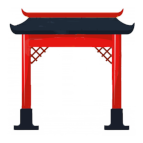| Meaning |

past tense identifier 了
|
| Explanation |
|
Used in these characters:
|
|
了
|
 |
|
JLPT HSK 1 |
|
| to be completed, to understand clearly, past-tense-suffix
|
A child 子, but without arms
A child without arms? I understand: It has to be completed!

|
|
|
|
疗
|
 |
|
JLPT HSK 5 |
|
| medical treatment, to cure, therapy
|
Left: disease 疒 (An ice- 冫-cold building 广 makes sick.), right: past tense identifier, to fulfill 了 (The still arm-less 了 child 子 should be completed.)
Turning the disease into 'history', means: treatment. - Or: The disease of the arm-less 了 child 子, shall be treated.

|
|
|
|
哼
|
 |
|
JLPT HSK 6 |
|
| to groan, to snort, to hum, to croon, humph!
|
Left: mouth 口, right: prosperous 亨 (Who makes big/high 高 things to accomplish 了 is prosperous.) [了 = The still arm-less 了 child 子 should be completed.]
Out of the mouth 口 below the nose 亠, this mouth 口, comes out 了 a groan.

|
|
|
|
辽
|
 |
|
JLPT HSK 6 |
|
| distantly apart, far away
|
Left: movement 辶, right: perfect suffix, to accomplish 了 (The still arm-less 了 child 子 should be completed.)
Since his movement was in perfect tense, he is in far distance.

|
|
|
|
亨
|
 |
|
JLPT no HSK |
|
| prosperous, flourish
|
Top: variation of high 高, bottom: perfect suffix 了 for accomplishing (The still arm-less 了 child 子 should be completed.)
Who makes big/high things to accomplish is prosperous.

|
|
|
|
亟
|
 |
|
JLPT no HSK |
|
| urgent, repeatedly, frequently
jí, qì
二
了
 |
|
Outside: sigh, gasp 叹 (The mouth 口 should be (covered) with the hand 又, when: sighing.), inside: to accomplish (Past-suffix) 了 (The still arm-less 了 child 子 should be completed.), at the bottom the not yet accomplished arms 一
He sighed at the completion because it was so urgent.

|
|
|
| Radicals are shown here that are similar either in appearance or meaning. |  |
|
|
List of the characters |
List of the radicals
|

